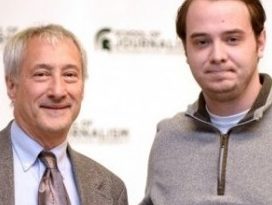
Apoorva Joshi
Doctoral student and Knight Center-affiliated research assistant, Apoorva Joshi, was awarded the annual Theodore Roosevelt Conservation and Environmental Leadership Fellowship by Michigan State University this month.
The fellowship, announced by MSU’s Graduate School, aims to provide graduate or professional students the support to pursue opportunities for gaining leadership experience in environment or conservation-based professions or programs. Recipients are required to have exhibited an interest in leadership and in local and global environmental and conservation issues.
As a 2016 recipient of the Environmental Science and Policy Program’s Doctoral Recruiting Fellowship at MSU, Joshi has consistently demonstrated an active interest in environmental issues including wildlife conservation, human-wildlife conflict resolution, and environmental communication. Her interests and current work as a PhD student with the School of Journalism is concerned with better understanding these complex contemporary environmental issues which often transcend disciplinary confines.
The Theodore Roosevelt Conservation and Environmental Leadership Fellowship, as described by the Graduate School, not only encourages such interdisciplinary approaches to studying environmental issues, but also urges students working in this sphere to seek and gain valuable leadership experience in “effective and efficient management, protection and conservation of natural resources.”
Joshi is presently a second-year doctoral student in the Information and Media program, and is pursuing a dual major in environmental science and policy and a graduate certificate in conservation criminology.
Interested in environmental and risk communication, international environmental crime and policy, and environmental attitudes and behaviors, Joshi came to Michigan State University in the fall of 2016 after working for two years as an environmental correspondent for online news site, Mongabay.com. She received her Master’s degree in environmental journalism in 2013 from the University of Montana, Missoula, and her Bachelor’s degree in environmental science from the University of Pune in Pune, India, where she is originally from.
With the support she has received through the Theodore Roosevelt Fellowship, Joshi hopes to undertake internships with the United Nations Office on Drugs and Crime (UNODC), and the Freeland Foundation. These internships will provide hands-on professional leadership experience in learning how international wildlife crime is dealt with in both developing and developed regions of the world by large multi-function organizations like the UN and by organizations like Freeland which focus specifically on wildlife and human trafficking.
Considering the far-reaching impact of communication in increasingly global environmental issues that span multiple cultures, nations, languages and policies, these internships will add a valuable real-world perspective to the interdisciplinary research Joshi will be conducting during her time at MSU. Eventually, she hopes, the academic and practical aspects of contemporary environmental challenges can be address in unison instead of being considered independently, and to that end, this fellowship will help her fulfil her motto of ‘conservation through communication.’










